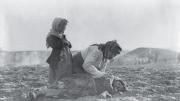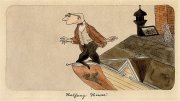Arts & Crafts Architecture: History and Heritage in New England, by Maureen Meister (University Press of New England, $45). This useful illustrated guide to the movement that flowered from 1890 to 1920 puts into context Radcliffe’s Fay House, the McLean Hospital campus, Phillips Brooks House, and many iconic homes.
Writing Architecture (Trinity University Press, $18.95 paper), by 1985 Loeb Fellow Carter Wiseman, now a lecturer at the Yale School of Architecture, puts this genre of productive criticism in its wider context.
God’s Planet, by Owen Gingerich, professor of astronomy and of the history of science emeritus (Harvard, $19.95). The expert on Kepler and Copernicus explores personally the meaning of “metaphysics” in the sense of “beyond physics”: how the pursuit of science intersects with and is informed by faith—“an appreciation that there are differing magisteria, with differing paths to understanding.”
Does Regulation Kill Jobs? edited by Cary Coglianese, Adam M. Finkel ’79, M.P.P. ’84, S.D. ’87, and Christopher Carrigan, Ph.D. ’12 (Pennsylvania, $49.95). The authors of 14 decidedly academic essays find evidence on either side of the heated rhetoric about “job-killing regulations” far from settled, with claims requiring much more, and more nuanced, analysis.
Walter Lippmann: Public Economist, by Craufurd D. Goodwin (Harvard, $35). Lippmann, A.B. 1910, Litt.D. ’44, was, of course, a formidable public journalist. But as Goodwin, an economic historian at Duke, also makes clear, he was the leading expositor of economics to an American populace buffeted by the Great Depression, World War II, and the country’s new global role. In the current era of turbulent (or gridlocked) policymaking, the country could, perhaps, use a Lippmann clone.
The Secret History of Wonder Woman, by Jill Lepore, Kemper professor of American history (Knopf, $29.95). The comic-book superheroine, created in 1941 by William Moulton Marston, A.B. 1915, LL.B. ’18, Ph.D. ’21, turns out to have a backstory as complicated and unlikely as her creator’s academic preparation for his role. His personal life, involving living with three women and having children with two, had its own secrets, too.
A Chosen Exile: A History of Racial Passing in American Life, by Allyson Hobbs ’97 (Harvard, $29.95). The author, assistant professor of history at Stanford, probes the history of African Americans who presented themselves as white, a “chosen exile”—once, a way to elude the constraints of Jim Crow; later, a betrayal of essential identity—that illuminates the country’s continuing confrontation with race.
The Sense of Style, by Steven Pinker, Johnstone Family professor of psychology (Viking, $27.95). “I love style manuals,” notes Pinker, confessing an affection for Strunk and White. To his own “thinking person’s guide to writing in the 21st century,” the author brings not only experience as a best-selling author (The Blank Slate, The Language Instinct), but also insight as a cognitive scientist—a new perspective on the genre—who is comfortable talking about “reverse-engineering good prose.”
The Royalist Revolution, by Eric Nelson, professor of government (Harvard, $29.95). What if the American Revolution aimed not at a tyrannical king, but at the British Parliament? Nelson interprets the founding as a rebellion in favor of restoring royal prerogatives unjustly usurped—a sentiment embodied in the new nation’s powerful presidency.
Just Mercy, by Bryan Stevenson, J.D.-M.P.A. ’85 (Spiegel and Grau, $28). Professor of clinical law at New York University and founder of the Equal Justice Initiative, Stevenson litigates on behalf of poor defendants, prisoners locked up without parole, and those facing capital punishment. He draws on his cases, like that of Walter McMillian, sentenced to death and finally exonerated, to demand changes in an unequal criminal-justice system.
Island Naturalist, by Kathie Fiveash ’69 (Penobscot Bay Press, $27.95 paper). If you are cross about having summer in the rearview mirror, Fiveash’s collected newspaper columns, from Isle au Haut, six miles off the Maine coast, may take you back to the idle hours of looking for periwinkles, being startled by a garter snake, or wondering about dragonflies’ gossamer wings.
MOOCs, by Jonathan Haber ($13.95 paper), and The War on Learning, by Elizabeth Losh ’87 ($29.95; both MIT Press). Haber, an education consultant, signed up for enough online courses, including several from HarvardX, to pursue the equivalent of a four-year degree in one year; he now concisely reflects on the promises and limitations of this technological innovation in teaching. Losh, director of the culture, art, and technology program at the University of California, San Diego, probes (critically) the technological assumptions underlying online and other learning systems.
A Land of Aching Hearts: The Middle East in the Great War, by Leila Tarazi Fawaz, Ph.D. ’79 (Harvard, $35). The author, an historian at Tufts (and past president of the Board of Overseers) tells the personal story of those in “Greater Syria” whose lives and national identities were changed by the end of Ottoman rule. Slightly farther east, physicist Jeremy Bernstein ’51, Ph.D. ’55, provides a succinct, lay explanation of one of the persisting points of intense friction in the region, in Nuclear Iran (Harvard, $18.95).
Disconnected: Youth, New Media, and the Ethics Gap, by Carrie James, lecturer on education (MIT Press, $24.95). How do young people, surrounded by social media, learn to think about privacy and participation as they develop and evolve as ethical beings? James, of the Graduate School of Education’s Project Zero, who interviewed many youngsters, finds a need for mentorship, guidance, and the attributes of citizenship online.
Rocket and Lightship, by Adam Kirsch ’97 (W.W. Norton, $26.95). The latest collection of essays on literature and ideas, by the prolific critic and poet (this is his seventh book), ranging widely from Hannah Arendt and Walter Benjamin to Proust, Darwin, and David Foster Wallace. Kirsch is a Harvard Magazine contributing editor.
Everything I Never Told You, by Celeste Ng ’02 (Penguin, $26.95). “Lydia is dead” is the first sentence of this acclaimed debut novel, a portrait of a Chinese-American family in Ohio in the 1970s; as an undergraduate, the author was an intern at this magazine.









